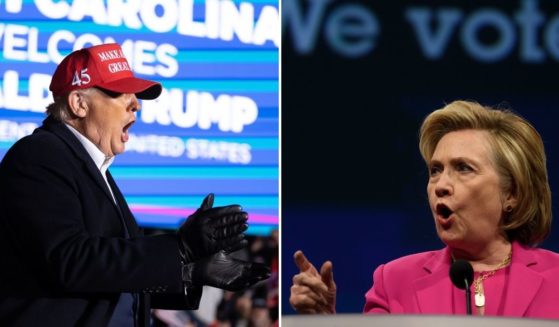
Former President Donald Trump is taking Hillary Clinton to court.
Trump is suing a range of Democrat politicians, operatives and federal agents for their role in creating the Russiagate hoax in 2016.
He’s seeking damages for the costs the conspiracy theory inflicted on his reputation and campaign, as well as for legal fees spent defending himself.
The lawsuit was filed in the US District Court for the Southern District of Florida on Thursday.
“Acting in concert, the Defendants maliciously conspired to weave a false narrative that their Republican opponent, Donald J. Trump, was colluding with a hostile foreign sovereignty,” alleges Trump’s lawsuit.
“The actions taken in furtherance of their scheme—falsifying evidence, deceiving law enforcement, and exploiting access to highly-sensitive data sources – are so outrageous, subversive and incendiary that even the events of Watergate pale in comparison.”
Trump is seeking to recover $24 million dollars that he spent on legal fees to defend himself from Democratic conspiracy theories.
The suit names a wide range of Democrats as defendants, most significantly Clinton.
The Democratic National Committee, Debbie Wasserman Schultz, John Podesta and Jake Sullivan are among the other defendants named by Trump.
Trump’s 108-page legal document cites the resources and planning involved in creating the Russiagate narrative.
It alleges intelligence agencies and corrupt government officials collaborated with partisan Democrats to spin the ‘collusion’ fantasy.
Disgraced FBI agents Peter Strzok and Andrew McCabe are also named as defendants in the suit.
It’s notoriously difficult to secure judgments against public figures in the courts, although pervasive law enforcement corruption involving the Russiagate hoax could give Trump’s lawsuit a strong chance.
Special Counsel John Durham is continuing to investigate the FBI’s involvement and role in the creation of the Russiagate conspiracy theory.
False claims of ‘collusion’ between the Trump campaign and Russia spurred Robert Mueller’s special counsel investigation.
The Mueller investigation failed to establish any evidence of collusion between Trump and Russia.
The very concept of Russian interference in the 2016 presidential election is fundamentally flawed.
Most claims of supposed grand Russian plots boil down to little more than propaganda social media pages with diminutive audiences.
It’s not uncommon for foreign powers to disseminate propaganda and information during the elections of their rivals.
A team of Russian intelligence agents indicted by Robert Mueller worked to propagate social media content harmful to Trump, as well as Clinton.
The Justice Department ultimately dropped charges against the Russian companies accused of “interference” in the election, according to the New York Times.
